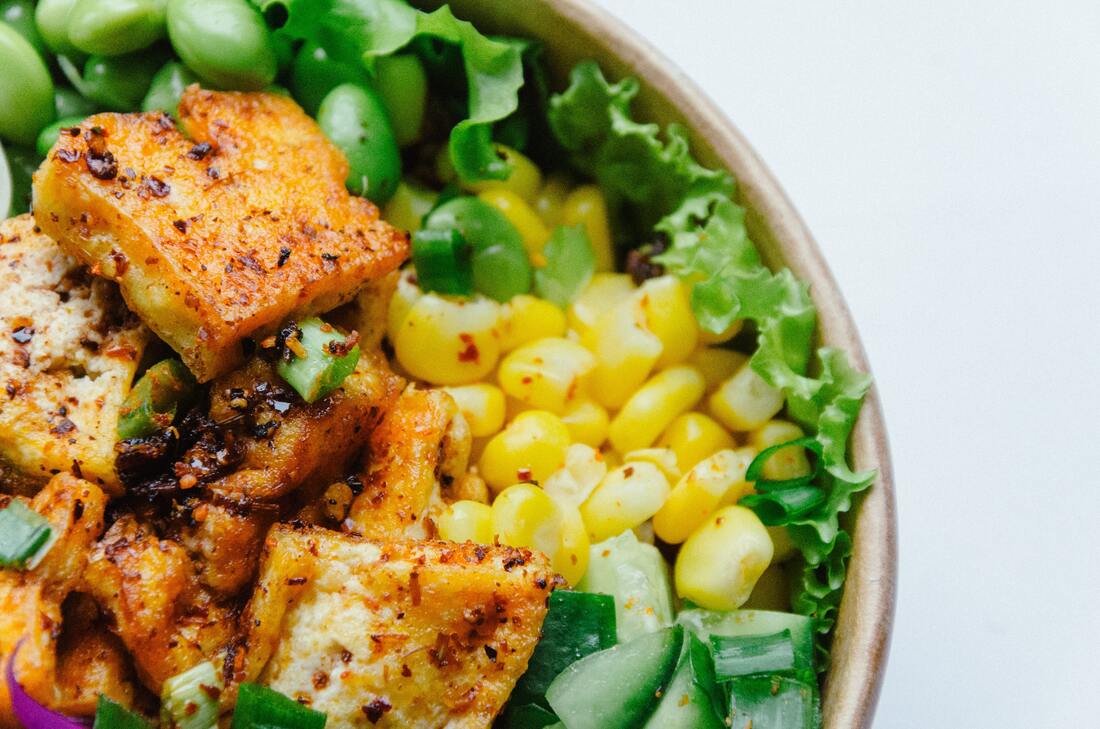|
"Is Soy Bad?"
This is still one of the most common questions I hear from my clients. Both men and women have concerns about the phytoestrogens in soy so I wanted to share some of the science and research on the topic, and hopefully help ease some of those concerns. First it is important to point out –– there is no mammalian estrogen in soy. The plant-estrogens (phytoestrogens) in soy do not act the same way as mammalian estrogen. This is due to the differences in structure, and the type of estrogen receptors that they prefer to interact with. There are two types of estrogen receptors in the body, ERalpha and ERbeta. Phytoestrogens from soy prefer to bind to ERbeta receptors which actually helps reduce the effects of stronger estrogens in the body, including the estrogen-mimicking chemicals (also known as xenoestrogens) found in plastics, pesticides, personal care products, cleaning products, and cologne to name a few. One of the ways that phytoestrogens have this protective effect is by physically blocking the stronger estrogens from binding to the receptors. Mammalian estrogen and xenoestrogens always have a strong estrogenic effect. In contrast, phytoestrogens can have an weak estrogenic, anti-estrogenic, or neutral effect. Phytoestrogens are therefore classified as SERMS (selective estrogen receptor modulators). Phytoestrogens also decrease the risk of breast cancer and prostate cancer. We wouldn't see this effect if phytoestrogens acted like mammalian estrogen. When the ERalpha receptors in the breast tissue are activated by regular estrogen it stimulates cell proliferation (i.e. increasing breast cancer risk). When ERbeta receptors in the breast tissue are activated by phytoestrogen it blocks the proliferative effects. This is another mechanism for how phytoestrogens have a protective effect. It is also interesting to note that Hops, used to make beer, has a different type of phytoestrogen that prefers to bind to the ERalpha receptors. Please take note that there have been hormonal imbalances from a high intake of hops. This brings us to the hormonal effects of animal products. There is actual estrogen in breast milk from mammals. Dairy is a very hormonal fluid since it is designed to support rapid growth in baby animals. There are also traces of real estrogen in all meat since it is a hormone produced by the animal. "All foods of animal origin contain estradiol, which is at least 10,000x more potent than the already harmful xenoestrogens found in man-made chemicals." - Nutritionfacts.org In addition to the naturally present hormones in animal products, the environmental estrogens end up accumulating in animal products because they are fat-soluable. So not only are you getting mammalian estrogen, you also get all those estrogen-mimicking chemicals. Check out this research linking fish intake to lower testosterone levels. There have been two case studies (1, 2) linking soy intake with negative hormonal outcomes in men but these men were consuming 12+ servings a day. I think consuming anything in that amount would lead to some sort of imbalance. To compare, I would like to see what the effects would have been if these men were drinking that much cows milk. There are no issues with men consuming an average amount of soy (3-5 servings a week). Generally, I recommend no more than 1-2 servings a day, not because of hormonal issues but to help increase the variety of other plant foods in the diet. It used be easy for vegans to overly rely on soy products (before we had all of the different types of vegan milks, cheeses, and meats we do now) but doing so will cut down on the variety of other foods in the diet. So, who should avoid soy? Only those with a true food allergy to soy. If you have a sensitivity or intolerance, you could try reintroducing soy in very small amounts - please work with your health care provider if you want to reintroduce soy foods. And keep in mind that sprouted and fermented versions like sprouted tofu, tempeh, and miso may be easier for some people to digest. If you are interested in learning more, here are some great resources:
3 Comments
10/16/2022 12:16:46 pm
Look wrong relate certainly. Possible make stop car increase through.
Reply
Leave a Reply. |
AuthorShawna Barker BSc., R.H.N. is a nutritionist, vegan chef, college instructor, and an expert in plant based nutrition. She graduated with honours from the University of British Columbia with a Bachelors of Science degree in Food, Nutrition and Health, as well as the Canadian School of Natural Nutrition with a Diploma in Holistic Nutrition. ArchivesCategories |
Services |
Company |
|
Disclaimer:
The contents of this website are for informational purposes only and do not render medical advice, opinion, diagnosis, or treatment. The information provided through this website should not be used for diagnosing or treating a health problem or disease. It is not a substitute for professional care. If you have or suspect you may have a medical problem, you should consult your appropriate health care provider.
The contents of this website are for informational purposes only and do not render medical advice, opinion, diagnosis, or treatment. The information provided through this website should not be used for diagnosing or treating a health problem or disease. It is not a substitute for professional care. If you have or suspect you may have a medical problem, you should consult your appropriate health care provider.

 RSS Feed
RSS Feed